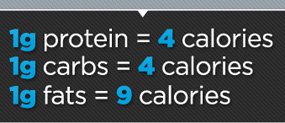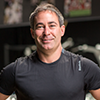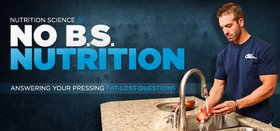No BS Nutrition: Fat Loss Q&A
What you eat is just as important as how much you lift or how fast you run. We've got answers to your pressing fat-loss nutrition questions.
What you eat and how you eat it can make or break your fitness program, regardless of workout quality. So I ask all of my training clients to take an orientation class laying the foundation for fundamental nutrition concepts as they relate to performance and fat loss.
The class is a big hit. Since starting it several years ago, I've seen drastic changes in how quickly my clients excel during training. Though I cannot tell you the method I use is the best and only way to do things, I can tell you the Performance U method is simple, practical and, most importantly, it works! If it didn't, I wouldn't be in business.
The article summarizes the questions my students typically ask. So listen up — class is in session!
calorie-restricted diets?
Everyone knows the word calorie. Many folks even know how many calories they consumed per day. However, I'm shocked at the amount of athletes who do not know what a calorie actually is.
If you did not know that a calorie is a unit of heat, you may not know as much about nutrition as you thought. Your body is essentially a heat machine. Hence the term "burn" calories.

Become a lean, fat-burning machine with clean, green fuel.
There is certainly merit to the relationship of how many calories you consume per day to the amount you burn per day. However, using the system described in this article, my clients take in fewer calories, and burn more, without counting.
Unless you are an advanced athlete or a physique competitor in the later stages of a fat loss phase, I don't recommend counting calories, because not all calories are created equal.
Let's take two guys of fairly equal size and fitness level. We put both guys on the same training program and allow each man to eat 3,000 calories per day.
- Guy A can only get his calories from lean meats and fish; fresh fruits a vegetables; and sweet potatoes and brown rice.
- Guy B can only get his calories from candy, ice cream and fast food.
After eight weeks, who do you think is going to look and perform better? Obviously it's Guy A. Even though both men trained the same way and ate the same amount of calories, they will definitely end up with different results.

His calves wouldn't be that shredded if his Tupperware was full of ice cream.
When it comes to calories, my approach is to emphasize quality over quantity. If you concentrate on the quality of the calories you consume, you end up taking in less calories total: most high-quality foods (chicken breasts, veggies, etc.) are low in calories.

It's no secret that too much fat in a diet is not a good thing. But, cutting out all fat is not a good idea either.
Keep in mind that one gram of fat equals nine calories, while one gram of protein and/or carbs equals only four calories.
If your current diet consists of 30% fat (or more) and you decide to simply cut it all out, you have eliminated a significant portion of your calorie intake.
Dropping your calories too low will drastically slow down your metabolism, and your body will start to feed off of muscle tissue. Unless you're stranded on an island, cannibalizing yourself is not good!
Additionally, we all know how bad it feels when we don't eat enough; it becomes difficult to concentrate on a simple conversation, much less to hit it hard in a workout.
low-carb approach, bruvva?
People who cut carbs lose weight fast. That's because they lost mostly water weight, since glycogen holds more than double its weight in water. This is why just using a scale to gauge your progress is a bad idea.
Glycogen is burned throughout the day, and eating carbs refuels your tank. If you suddenly stop refilling the tank, your body still needs a source of fuel for the brain.
In this case, your body will make its own glycogen by breaking down muscle tissue. Again, not good!
Cutting carbs too drastically will send you into a state of Ketosis, which is when you have an abnormal amount of ketone bodies in the blood.
Ketone bodies are produced when carbs are scarce and energy must be obtained by breaking down fatty-acids.Ketone bodies are created to help feed the brain, being that most long-chain fatty acids cannot pass the blood brain barrier.
One of the byproducts of ketone bodies breaking down fatty-acids is acetone, yep, paint remover. The longer you go without glucose, the more ketone bodies have to be produced by the liver, and the more acetone develops in the system.
should that be my goal?

Most medical resources regard ketosis as a physiological state associated with chronic starvation. Ketosis would thus be a dangerous (potentially life-threatening) state, which unnecessarily stresses the liver and causes destruction of muscle tissues.
Finally, after maintaining a low-carb diet, when you do decide eat carbs, your body has no idea how to process them and will immediately turn them into triglycerides, which is a fatty acid.
Put simply, your body forgets how to use carbs and will immediately store them as fat.
The long-term solution is not to simply cut things out, but to replace what you're currently eating with better and more thermic foods that your body can use. This is what I call complementary eating.
A complementary meal consists of:
- Lean protein (eggs, chicken, fish, bison, beef, low fat dairy, etc.)
- Fibrous carbohydrate (fruits and vegetables)
- Starchy carbohydrate (sweet potatoes, brown rice, oatmeal, etc.)
- Healthy fats (monounsaturated, Polyunsaturated, Omega-3 fatty acids - avocado, nuts, olive oil, etc.)
I call it complementary eating because each aspect complements the other: proteins build muscle; starchy carbs create energy; fibrous carbs move it all through the body; and healthy fats promote joint health, heart health and cognitive function.

Dem eggs are delicious, but they're better with buddies: fruits, veggies, or even a potato pal.
The first question that I always get is, "How big should my meals be?" It differs for every person and should be based on how you feel and how much fuel your body requires that day.
I recommend eating portions that are visually equal of protein, fibrous and starchy carb. Don't forget to eat a small portion of fat; monounsaturated, polyunsaturated, and omega-3s provide many health benefits. However, too much fat in any form provides excess calories in the diet.
If you're hungry within an hour after finishing your meal, you probably didn't eat enough. On the flipside, upon finishing, if you feel full for hours, you probably ate too much.
It really comes down to intuition and listening to your body.
We recommend eating about every 2-and-1/2 to 3-and-1/2 hours.
I'm trying to melt fat?
Protein builds muscle, and muscle is the most metabolically active tissue. In other words, muscle is the place in your body where fat is burned.
More muscle requires more energy. So the more muscle you have, the more calories/fat you'll burn over a 24-hour period of time.
Essentially, you want to be opposite of your car: you want to become gas inefficient. Weight train: lift heavy, lift hard, and lift often (3-to-5 times per week).
Index play in fat loss?
The glycemic index was designed as a quick and convenient way to find out how fast your blood-glucose levels will rise after you eat different foods. We have always been told to eat foods lower on the glycemic chart to lose fat.
What you may not have been told is that the glycemic index only applies to individual foods.
In other words, if you eat blueberries alone, you will get an insulin spike. However, if you eat the blueberries with some cottage cheese, you won't get much increase in insulin production because the protein in the cottage cheese offsets the sugars.
So, if you are going to eat fruit, eat it with some protein. Starchy carbs will also cause an insulin spike when consumed alone. This is why it's important to eat complementary meals together.
and still lose fat?
We all have high-fat, high-calorie foods that tempt us. My belief is if you want to keep your sanity and want to manage your "healthy diet" with a consistent lifestyle, you must occasionally eat the "not so healthy" foods you love.
I tell my clients to follow the 80/20 rule. If you eat in the way I've described above 80 percent of the time, then you can eat whatever and however you want the other 20 percent.
If you're actively training for a physique show or a sporting competition, you may have to be slightly more strict than 80/20 for the short time you're in prep phase. But, for the most part, life is too short to be stressed and unhappy because you can't eat the foods you enjoy.

